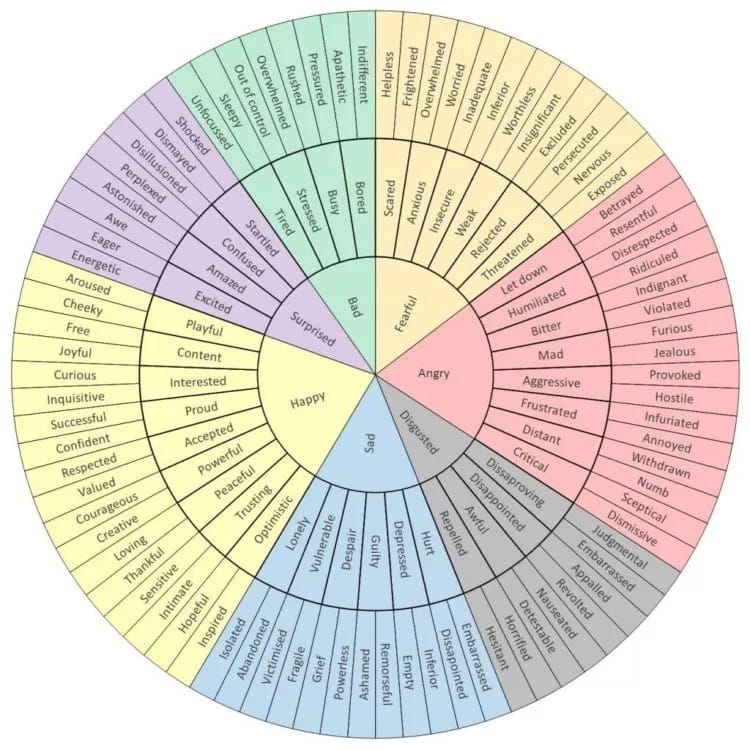Emo-Diversity – What is THAT??
This is the Emotions Wheel
It shows nearly 100 different emotions – and there are MANY more. So at it’s simplest level, Emo-diversity is recognising that as humans we are capable of a vast number of emotions.
Emo-diversity is GOOD for our Wellbeing
It isn’t reasonable to expect everyone to go around being “Pollyanna”-ish, happy, happy, happy all day long! Life is often difficult, stressful and challenging in many ways. We are complex beings, with a wide range of feelings and experiences.
Whilst it is wonderful to have great equanimity we are all allowed to experience the various emotions without having to try and bury or hide them. In fact, science tells us that those who do experience a wide range of emotions are actually happier than those with a narrower range of emotions – even if they are all positive ones. So avoiding negative emotions is NOT, it turns out, the answer to good emotional health & wellbeing. Just like bio-diversity, we need a plethora of emotions.
Know, label, differentiate your feelings
Drill down into your emotions. This might not be so easy – use the emotions wheel above to help you.
You may have been told it is not “nice” to be angry, so you say you are fed up, or sadness is for “wimps” so you say you are “cheesed off”.
You can see that actually knowing what our feelings are is going to be a big first step. We can have a rich tapestry of emotions, or we can stick to the 5 or 6 we “allow” ourselves to have. Just knowing that denying our feelings is not helpful, can make us more willing to be curious about what it really is we are feeling.
Someone might say something to us which makes us cross – if we drill down, maybe cross is hurt, maybe hurt is frightened, maybe frightened is vulnerable, maybe the message is that the person saying what they did made us feel hurt, frightened and vulnerable. Our response may be different if we allow those feelings.
What do they really mean to YOU? Practice doing this, because the rewards are being able to handle stress better and being less likely to become depressed.
Embrace your “bad” feelings or moods
Whilst we prefer our more positive and cheerful moods and feelings, all of our emotions are telling us something if we listen to them and use them. Life’s ups and downs happen and whilst we don’t want to be on a roller coaster of varying feelings, finding out what we can learn from our feelings is better for us than ignoring them. What can you learn from your “bad emotions”?
Maybe you were hoping to get a piece of work and didn’t succeed. Anyone would be left feeling disappointed. If we struggle against that feeling – and then often compound it with some highly critical self-judgement, we aren’t being authentic to ourselves and feelings. Just accepting that we are disappointed is enough – that is the reality. It is acceptable and reasonable to feel it.
Disappointment may also make us feel sad, worried and less capable. But if we can learn from it – maybe the takeaway will help us to be more successful. Next time try x/y/z. We can come back with more resilience and strength.
(Learning about our emotions and our compassionate response to them will feature in an upcoming Blog about Self-Compassion.)
Welcome your negative emotions as though they were a guest in your home
How come they showed up? Is there a message for you? Are they trying to tell you something? What can you learn from them?
When our “feelings” think that they have been heard they will then be happy to leave. If not, the feelings that we are trying to deny, or are hiding from, or trying to ignore will hang around and be trapped in our “house”? Trying to get your attention and getting in the way of more positive guests/feelings, taking the shine off your joy and contentment? Sometimes we just need to ride the wave/weather the storm of our negative emotions, because they just ARE. They will pass, they are appropriate.
Some will need us to let them know that they aren’t needed at the moment – that gnawing worry that people are judging you for instance – reassure the feeling that it may have been needed once, you don’t need it anymore. Encourage other feelings that WILL be helpful here – confidence, courage – instead. We may have had a very worrying time, but we don’t need to remain on high alert forever – we can diversify.
Try it – keep practicing
By acting in this way we can often see the point of why they are there – and see the benefit from having them. Maybe they will spur us on to learn something new or rethink things, changing directions. At the very least we can become more aware of our feelings, give them a more accurate label and maybe get to know them and their purpose.
Reference – Emo-diversity and the emotional eco-system https://www.ncbi.nlm.nih.gov/pubmed/25285428
Sign up to receive our monthly newsletter HERE
Related tags: MHFA Training Uk, Mental Health Awareness Uk, Mental Health First Aid


